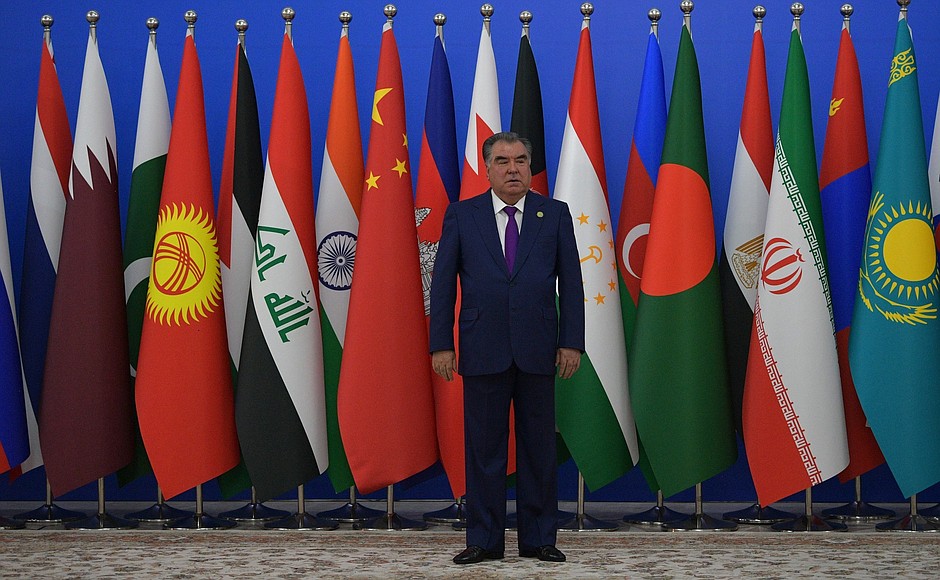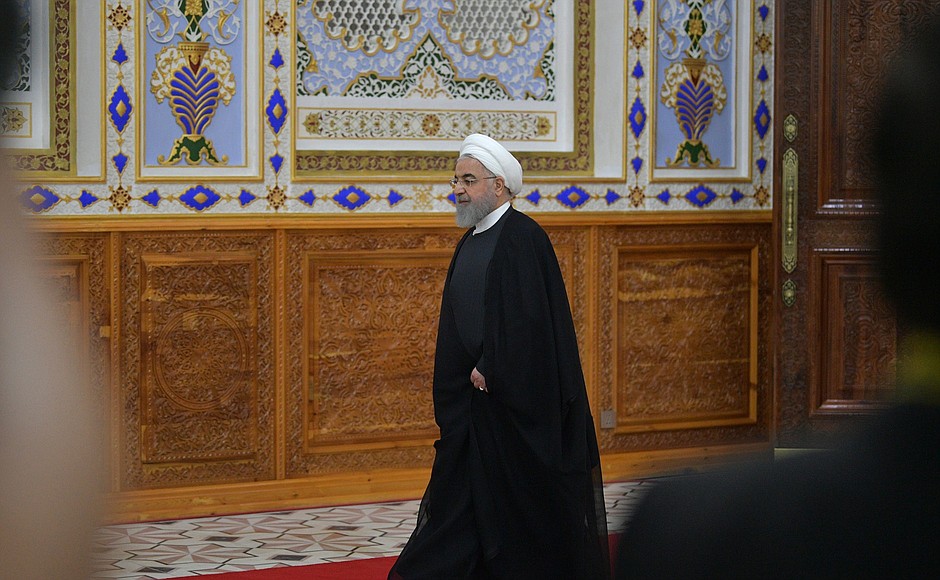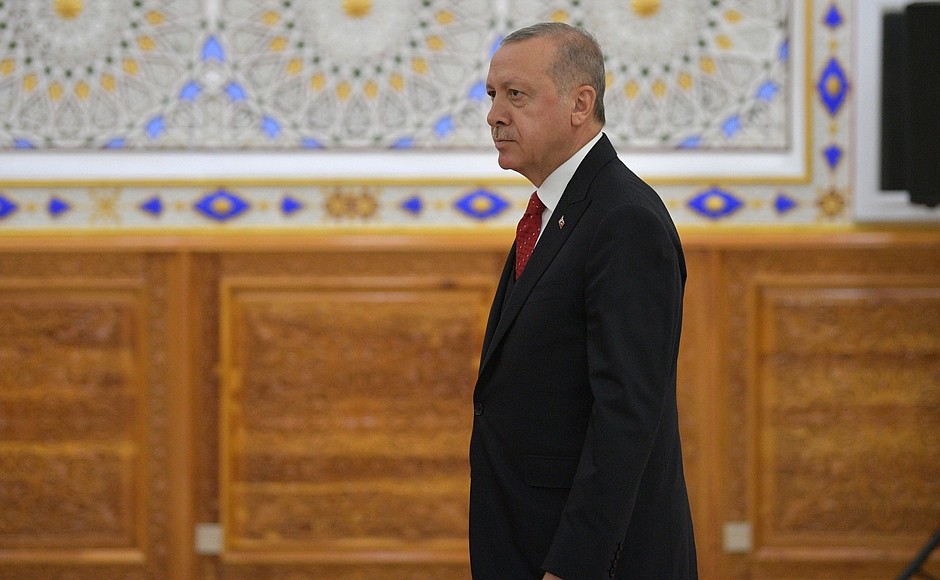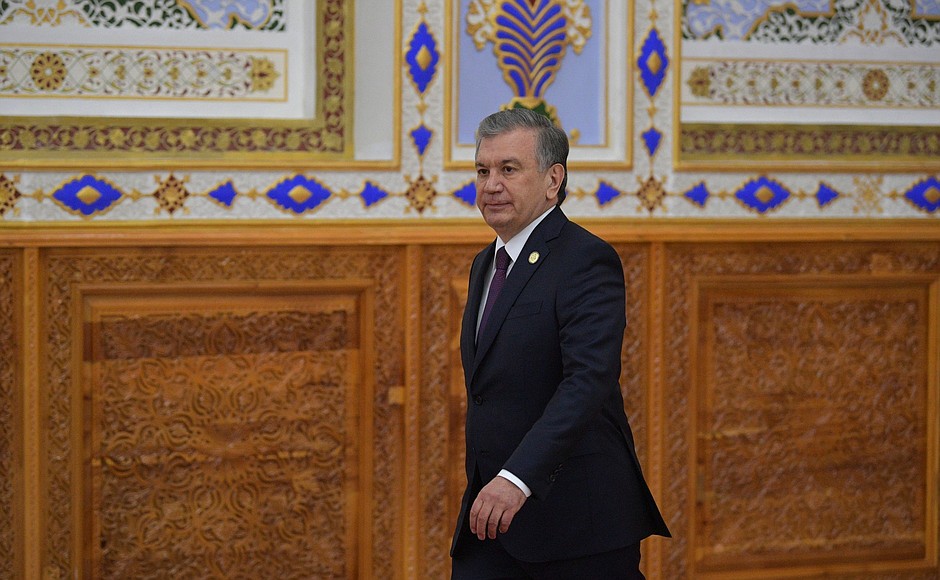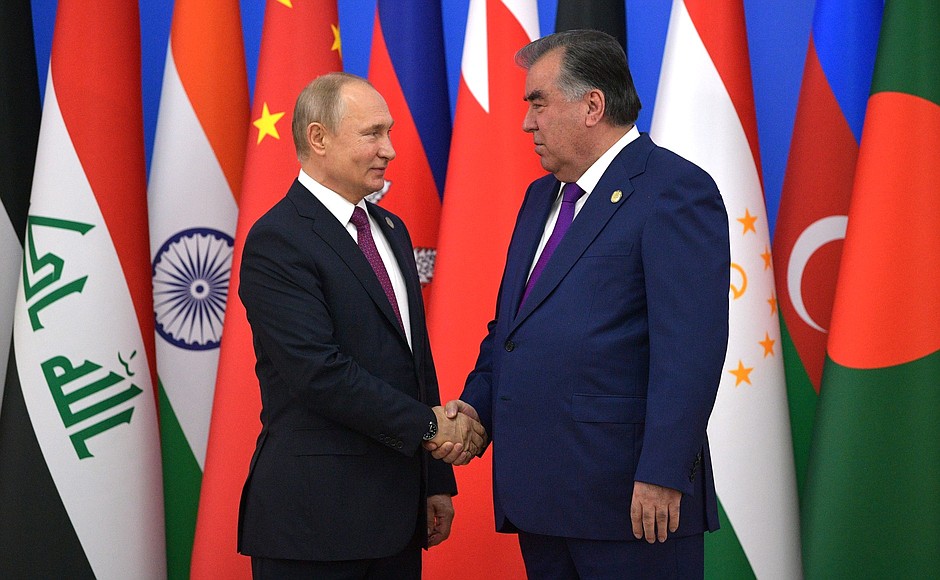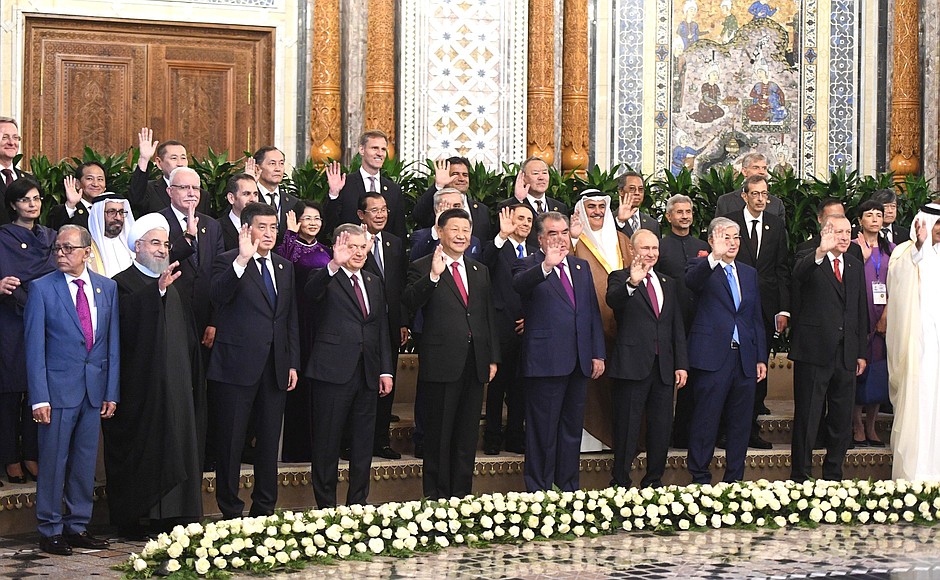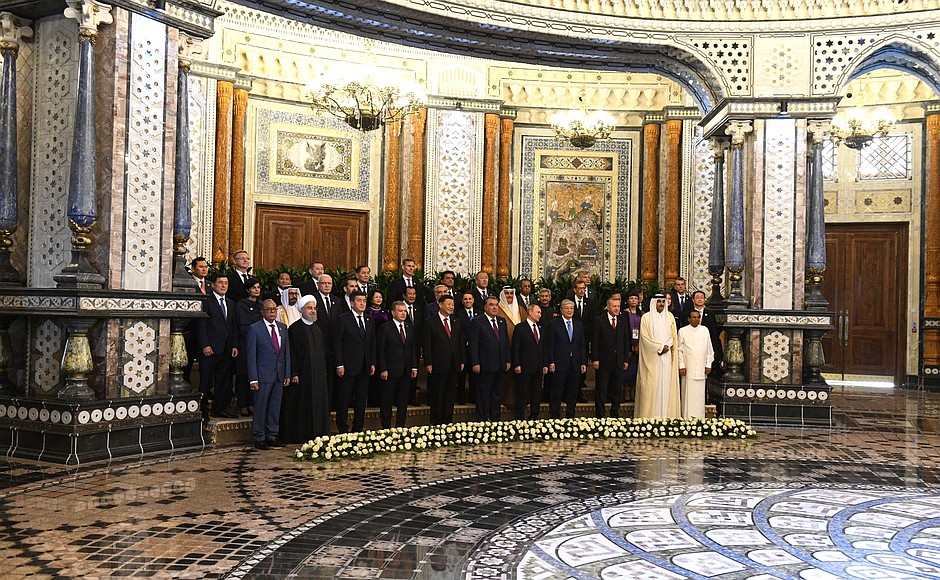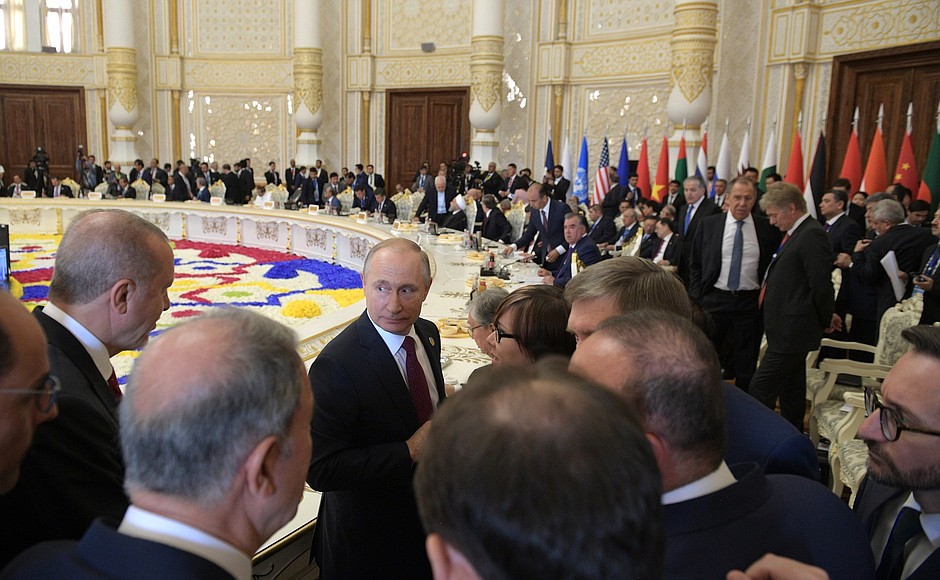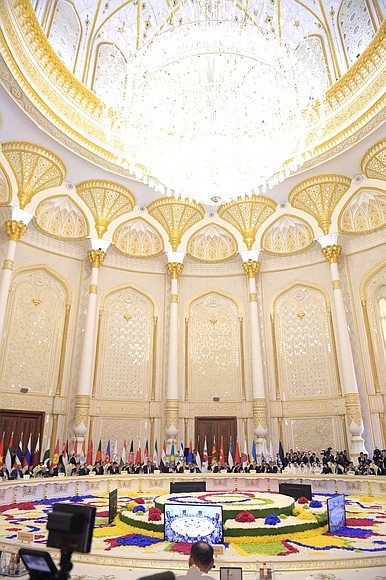The session was attended by delegations of 27 CICA member states and 13 observers, including representatives of international organisations – the UN, the League of Arab States, the International Organisation for Migration, the OSCE and the Parliamentary Assembly of the Turkic-Speaking Countries.
Approaches to ensuring regional and global security, strategic security and stability issues, and economic and humanitarian cooperation were the subjects of discussion.
The main outcomes of the meeting have been stated in a declaration.
* * *
Speech at the summit of the Conference on Interaction and Confidence-Building Measures in Asia (CICA)
President of Russia Vladimir Putin: Good afternoon, colleagues,
The President of Tajikistan and the President of the People’s Republic of China have just expressed crucial assessments of the current conditions and prospects for our countries’ work within the Conference on Interaction and Confidence-Building Measures in Asia. I also believe that our forum makes a major contribution to cooperation throughout the entire Asian space.
In line with the theme of the present session, Shared Vision for a Secure and More Prosperous CICA Region, I would like to stress that Russia’s aim is to explore interaction with all the CICA member countries on strengthening peace and stability in Asia. We stand for boosting joint efforts to establish a system of equal, common and indivisible security in Asia based on universally accepted principles of international law and the UN Charter, such as mutual trust, neighbourliness, respect for sovereignty and non-interference in internal affairs.
Truly sustainable stability system in Asia can obviously be achieved only through settling existing crisis situations and conflicts, and persistently combatting the threat of terrorism. To do that, cooperation should be stepped up in identifying and neutralising terrorist groups and cutting off their financing, including from drug trafficking.
It is a priority to do everything in our power to prevent terrorists from getting hold of chemical, biological or other kinds of weapons of mass destruction, and to thwart propaganda of extremist ideas.
The situation in Afghanistan is of special concern (I agree with our Tajikistani colleague on that), where radical extremist organisations, including the ones pushed out from the Middle East, are back to stepping up their activities. I will note that Russia assists the intra-Afghan dialogue in every possible way. In February and in late May Moscow hosted two rounds of talks between all key public and political forces of Afghanistan and the Taliban movement.
As the country currently holding the presidency of the Shanghai Cooperation Organisation, Russia will do everything to implement the roadmap adopted at the SCO summit, which wrapped up in Bishkek yesterday, on expanding interaction with Afghanistan on security, economic and humanitarian issues.
We believe that a lasting stabilisation in Syria is another top priority for ensuring security in our region. With Russia’s participation, the legitimate government gained control over most of the Syrian territory, and favourable conditions were created for the return of refugees and internally displaced persons. Cooperation between Russia, Iran and Turkey in the Astana format is bringing real results. Together, we assist in advancing intra-Syrian settlement process, including the formation and launch of the Syrian Constitutional Committee. It is crucial to start providing political transformations which are needed for normalisation in Syria.
Everyone is concerned about state of affairs with the Joint Comprehensive Plan of Action on the Iranian nuclear programme. The United States’ withdrawal from the agreement has significantly impeded its implementation, and has had a negative effect on the overall situation in nuclear non-proliferation. We believe that the only reasonable solution is for all signatories to continue honouring their commitments under the Plan, and this is what Russia is set to do.
As for the situation on the Korean Peninsula, there is and can be no alternative to a peaceful diplomatic path. This approach was the basis for the roadmap written in 2015 at our joint initiative with the People’s Republic of China. It was in this vein that we also held our talks with Chairman of the State Affairs Commission of the DPRK Kim Jong-un in Vladivostok, Russia, in April.
It is important that all the Conference member countries contribute as much as they can to the efforts on decreasing tensions on the peninsula and enhancing security in the whole of Northeast Asia.
Colleagues,
The focus of the discussions at the previous summit of the Conference on Interaction and Confidence-Building Measures in Asia, which was held in Shanghai in May 2014, was on issues of preventing the use of IT for undermining international peace and security. It was agreed then to promote the idea of drafting universal international rules for the responsible conduct in the digital space. I must say that certain results have been achieved.
At Russia’s proposal and with the support of many nations represented here – for which we are very grateful – the United Nations General Assembly adopted a resolution on the code of responsible conduct in information and telecommunications area. A process was launched to establish a UN working group on international information security.
Combined efforts of the Conference member countries are also needed to further enhance close economic ties in the whole Asian space. Today our region is the driver of global growth. It is home to large industrial and technological centres, and high-capacity financial, personnel and intellectual resources are concentrated here. In total, it gives the region unparalleled competitive advantages, and they must be utilised in full for the common benefit to ensure sustainable and dynamic development.
As a coordinator of the economic dimension at the Conference on Interaction and Confidence-Building Measures in Asia, Russia places special emphasis on the work on this track. Let me remind you that in 2015, at Russia’s initiative, a business council was set up within the Conference with the participation of our countries’ businesspeople, whereas for the present summit a memorandum on cooperation between small and medium-sized businesses was drafted.
We advocate increasing mutual trade and rejecting protectionism, illegal sanctions, politically motivated restrictions and barriers. We are committed to enhancing investment cooperation in all areas and expanding industrial collaboration on the basis of the universal WTO rules on the principles of equality, respect and consideration for each other’s interests.
We spoke in detail about this quite recently, just a week ago, at the St Petersburg Economic Forum. The essence of what we meant to say at the forum is that, unfortunately, real trade wars are breaking out in the world. In fact, fights without rules are underway, with intimidation and removing competitors using non-market methods. And our collective efforts are needed more than ever now to find a way out of this situation.
We need to reassert trust and establish standards for fair economic interaction. As a first step, we should at least ensure that trade and sanction restrictions do not apply to the social and humanitarian sphere. I am referring to essential commodities, medications and medical equipment. I think it is hard to disagree with that.
I would also like to note with satisfaction that the idea of aligning the ongoing integration processes within the Eurasian Economic Union, Association of Southeast Asian Nations, Shanghai Cooperation Organisation and China’s Belt and Road Initiative is gaining increasing support, including from the Conference members. This approach certainly meets our common interests.
In conclusion, I would like to thank President of the Republic of Tajikistan Emomali Rahmon for the warm reception and hospitality, and for the organisation of our joint work.
Thank you.
<…>
